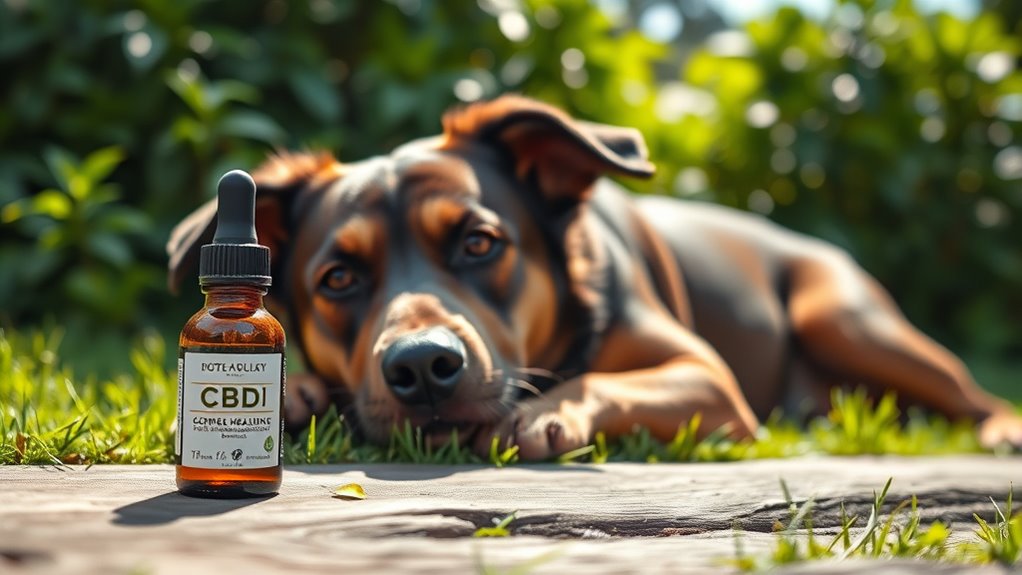Current evidence suggests CBD can help dogs manage anxiety, reduce pain, fight inflammation, and even support seizure control. It interacts with their endocannabinoid system to promote calming effects and alleviate discomfort. The safety profile is generally good, but you should start with low doses and consult your vet. Since quality varies, it is vital to choose reputable products. To understand how CBD might benefit your dog, look into the latest findings and guidelines.
Key Takeaways
- Scientific studies suggest CBD can reduce anxiety, stress, and hyperactivity in dogs by interacting with the endocannabinoid system.
- Evidence indicates CBD may help manage pain and inflammation, especially in cases of arthritis and joint discomfort.
- CBD has shown potential in decreasing seizure frequency in epileptic dogs, though responses vary and veterinary guidance is recommended.
- Safety is generally good, but side effects like drowsiness and dry mouth can occur; proper dosing and veterinary supervision are essential.
- Research is ongoing, and regulatory standards vary, emphasizing the need for quality-tested products and further clinical studies.
Understanding CBD and Its Origins

Cannabidiol, or CBD, is a natural compound found in the cannabis plant that has gained popularity for its potential health benefits. Its origins trace back through centuries of cannabis cultivation, where it was valued for various uses. Historically, cannabis was used for medicinal purposes across different cultures, often to treat pain, inflammation, and other ailments. Unlike THC, CBD doesn’t produce a high, making it appealing for health-related applications. Over time, scientists have isolated CBD’s properties and studied its effects. Today, the understanding of CBD’s roots in traditional medicine and its presence in cultivated cannabis helps explain why it’s become a focus for modern health solutions, including potential benefits for dogs. Additionally, ongoing research into CBD’s chemical composition continues to shed light on its diverse effects and safety profile, emphasizing the importance of cannabis-derived compounds in developing safe and effective products. A growing body of scientific evidence supports its potential therapeutic use, further fueling interest and research. Understanding the legal status of CBD is also crucial for ensuring safe and compliant usage across different regions.
How CBD Is Processed for Veterinary Use

When processing CBD for veterinary use, the extraction method is vital to guarantee purity and potency. Quality control measures help verify that the final product is safe for dogs and free from contaminants. Understanding these processes helps you choose high-quality CBD options for your pet’s health. Additionally, incorporating extraction techniques can influence the final product’s effectiveness and safety, making it essential to select products produced with reliable methods. Proper extraction methods, such as supercritical CO2 extraction, ensure that the CBD is free from residual solvents and other impurities. Moreover, employing certified testing laboratories guarantees that the product has undergone rigorous analysis for quality and safety. Furthermore, clear labeling and third-party testing are crucial in ensuring the product’s quality and transparency. Incorporating inspirational quotes about fatherhood can serve as a reminder of the importance of care and dedication in ensuring your pet’s well-being.
Extraction Methods
To guarantee the safety and effectiveness of CBD for veterinary use, it’s essential to understand how it’s extracted from the plant. Extraction methods influence purity and potency. Common techniques include solvent extraction and supercritical CO2 extraction. Solvent extraction uses alcohol or hydrocarbons to pull cannabinoids from plant material but can leave residues if not properly processed. Supercritical CO2 employs high-pressure carbon dioxide, which effectively extracts CBD without contaminants, yielding a clean product. Here’s a comparison:
| Method | Pros | Cons |
|---|---|---|
| Solvent Extraction | Cost-effective, widely used | Residue risk, potential impurities |
| Supercritical CO2 | Pure, environmentally friendly | Higher equipment costs |
| Both methods | Can produce high-quality CBD if done correctly |
Choosing the right method impacts product safety and efficacy for your dog. Additionally, proper extraction techniques are crucial to maintaining the integrity of cannabinoids, ensuring a safe and effective CBD product. Advances in extraction technology and adherence to quality standards are essential to prevent contamination and preserve cannabinoid potency. Implementing precise extraction processes can significantly reduce the risk of impurities and ensure consistent product quality. Moreover, selecting extraction methods with environmentally friendly practices can contribute to sustainable production standards.
Quality Control Measures
Ensuring the safety and effectiveness of CBD products for your dog begins with rigorous quality control measures during processing. Proper procedures guarantee labeling accuracy and safety. Here are key steps involved:
- Labeling Accuracy: Manufacturers verify CBD content to match product labels, ensuring you know exactly what your dog consumes. Verification processes are essential to confirm the accuracy of labeling claims. Incorporating advanced testing techniques enhances confidence in product accuracy.
- Contaminant Testing: Labs test for pesticides, heavy metals, molds, and residual solvents to prevent harmful substances.
- Extraction Validation: Ensuring extraction methods preserve CBD potency without introducing contaminants.
- Batch Testing: Consistent testing of each batch guarantees uniformity and safety across products.
- Technology’s Role: Advances in technology have enhanced the precision and reliability of quality control measures in CBD processing.
These measures help maintain high standards, giving you confidence in the CBD products you’re giving your dog.
Evidence for Anxiety and Stress Relief in Dogs

Research shows that CBD can help reduce anxiety in dogs, making stressful situations more manageable. Studies indicate that CBD lowers stress hormone levels, which are linked to anxious behaviors. This evidence suggests CBD might be a valuable option for calming distressed dogs. Additionally, ongoing research emphasizes the importance of AI safety measures to ensure responsible development and application of these therapies.
Anxiety Reduction Studies
Several studies have shown that CBD can effectively reduce anxiety and stress in dogs. When considering CBD dosing, it’s important to find the right amount for your dog’s size and behavior. Research indicates that CBD may help improve canine behavior by calming hyperactivity or fear responses. Here are some key points:
- Controlled trials show decreased anxiety scores after CBD administration.
- Dogs exposed to loud noises or separation anxiety exhibited calmer behavior with CBD.
- Proper CBD dosing is essential for consistent anxiety relief.
- Evidence suggests CBD’s calming effects are linked to its influence on the endocannabinoid system.
- Additionally, understanding the cost of CBD products can help pet owners make informed decisions about treatment options.
These findings support CBD’s potential as a natural option for managing anxiety in dogs.
Stress Hormone Effects
CBD appears to influence stress hormone levels in dogs, providing evidence that it can help alleviate anxiety and stress. It interacts with the body’s stress response, potentially modulating hormone regulation to reduce the release of cortisol and other stress-related hormones. This regulation may help calm dogs during stressful situations, such as thunderstorms or separation anxiety. Studies suggest that CBD’s effects on hormone levels contribute to its calming properties, supporting a more balanced stress response. By influencing hormone regulation, CBD helps prevent excessive stress responses that can negatively impact your dog’s well-being. Additionally, understanding how emotional intelligence affects stress responses can offer insights into supporting canine mental health. While research is ongoing, current evidence indicates that CBD’s ability to modulate stress hormones offers promising benefits for managing canine anxiety and promoting relaxation. Moreover, long-term effects of CBD on hormonal balance are an area of active investigation, which could further clarify its role in stress management. Recognizing the importance of balance in stress hormone levels aligns with ancient insights about harmony and well-being, further supporting CBD’s potential benefits. Furthermore, insights from creative practice can inspire innovative approaches to managing pet health and stress.
Pain Management and Anti-Inflammatory Effects

Have you ever wondered if CBD can help soothe your dog’s pain or reduce inflammation? Research suggests it might. CBD interacts with your dog’s endocannabinoid system, which plays a role in managing pain and inflammation reduction. Here’s what you should know:
CBD may help soothe your dog’s pain and reduce inflammation naturally.
- It may alleviate joint pain caused by arthritis or injuries.
- CBD’s anti-inflammatory properties could decrease swelling and discomfort.
- It might improve mobility by reducing pain-related stiffness.
- Consistent use could support overall comfort, especially in older dogs.
- Using reputable products and proper dosing is essential for safety and effectiveness vetted products.
Additionally, understanding the holistic SEO approach can help pet health resources better educate owners about CBD benefits. Proper storage of CBD products is important to maintain their potency and safety, ensuring effective relief for your dog.
Incorporating quality control measures, such as third-party testing, can verify the purity and concentration of CBD products. While more studies are needed, current evidence indicates CBD’s potential to help manage pain and inflammation naturally. Always consult your vet before starting any new treatment to ensure safety and proper dosing for your dog.
Impact on Seizures and Neurological Conditions

Many dog owners turn to CBD not only for pain relief but also for managing neurological issues like seizures. Research suggests CBD may help reduce seizure frequency, especially in dogs with genetic predispositions to conditions like epilepsy. While the exact mechanism isn’t fully understood, CBD’s interaction with the endocannabinoid system appears to modulate neural activity. Environmental triggers, such as stress or sudden noise, can worsen seizures, and CBD might help stabilize your dog’s neurological response. Although more studies are needed, initial evidence indicates CBD could be a valuable adjunct therapy for seizure management. Keep in mind, individual responses vary, and consulting your veterinarian is essential before starting CBD treatment for neurological conditions.
Safety Profile and Potential Side Effects

While CBD is generally considered safe for dogs, it’s important to be aware of potential side effects and safety considerations. Some dogs may experience adverse reactions, such as drowsiness, dry mouth, or changes in appetite. Additionally, CBD can interact with certain medications, leading to unexpected drug interactions. To stay safe, keep these points in mind:
- Watch for signs of excessive sedation or lethargy.
- Monitor for dry mouth or increased thirst.
- Be cautious if your dog is on other medications; consult your vet first.
- Start with a low dose and gradually increase to observe effects.
Dosing Guidelines and Administration Tips

Getting the dosing right is essential for your dog’s safety and effectiveness of CBD treatment. Accurate dosing ensures your dog benefits without adverse effects. Start with a low dose and gradually increase, monitoring your pet’s response. Use proper administration techniques like using a syringe or dropper for precise dosing. Consistency is key—give CBD at the same times daily. Here’s a quick guide:
| Dose Size | Frequency | Method |
|---|---|---|
| Small | 1-2 times daily | Dropper or capsule |
| Medium | 2-3 times daily | Dosed with a syringe or treat |
| Large | 3 times daily | Mix into food or water |
| Adjustments | Based on response | Consult vet for guidance |
| Storage | Keep in cool, dry place | Away from children and pets |
Prioritize dosing accuracy to ensure safe, effective CBD use.
Regulatory Status and Quality Control Concerns

The regulatory landscape for CBD products used in dogs varies widely across regions, leading to inconsistencies in quality and safety standards. This lack of uniform market regulation raises concerns about product safety and legal implications for pet owners. You need to be cautious because:
- Not all CBD products are tested for purity or potency.
- Some may contain contaminants or THC levels exceeding legal limits.
- Unregulated markets make it hard to verify quality claims.
- Legal implications may arise if products are misclassified or illegal in your area.
Understanding these issues helps you make informed decisions and avoid potential legal risks. Always look for products with transparent third-party testing, and stay aware of local laws governing CBD use for pets.
Future Directions in Research and Veterinary Recommendations

Research on CBD’s effects in dogs is rapidly evolving, and veterinary professionals are increasingly interested in understanding its potential benefits and risks. To establish clear veterinary guidelines, future research should focus on long-term studies that evaluate safety, efficacy, and ideal dosages over extended periods. These studies will help determine any delayed adverse effects and provide a thorough understanding of CBD’s impact on canine health. Additionally, developing standardized dosing protocols and quality control measures will support veterinarians in making informed recommendations. As evidence grows, veterinary guidelines can be refined to incorporate best practices for CBD use, ensuring safe and effective treatments. This ongoing research will ultimately help dog owners and vets make better decisions about CBD’s role in canine health management.
Frequently Asked Questions
Are There Specific Dog Breeds That Respond Better to CBD?
You wonder if certain dog breeds respond better to CBD. Breed-specific responses can occur because of genetic factors that influence how your dog processes and reacts to substances like CBD. Some breeds might experience more noticeable benefits or side effects due to their genetic makeup. Keep in mind, individual differences matter, so it is crucial to observe your dog closely and consult your vet before starting CBD, regardless of breed.
Can CBD Be Safely Combined With Other Medications for Dogs?
You might be surprised how common it is to combine CBD with other medications, but you should always proceed with caution. Drug interactions can occur, so it’s crucial to consult your vet about dosage considerations and possible effects. While CBD can be safe when used responsibly, never give it alongside other drugs without professional guidance to prevent adverse reactions and ensure your dog’s health stays protected.
How Long Does It Take to See Effects in Dogs After CBD Administration?
You might wonder about the onset time for CBD effects in dogs. Typically, you’ll notice changes within 30 minutes to 2 hours after administration. To guarantee safety and effectiveness, always follow dosage guidelines closely. The exact timing can vary based on factors like your dog’s size, health, and the form of CBD used. Consistent dosing and patience help achieve the best results.
What Are Signs of Overdose or Adverse Reactions in Dogs?
When monitoring your dog after CBD administration, it’s important to recognize signs of overdose or adverse reactions. Symptom identification helps you spot issues early, like excessive drowsiness, vomiting, diarrhea, or changes in behavior. Always consider dosage concerns; giving too much can increase risks. If your dog shows any of these signs, contact your veterinarian promptly to ensure their safety and modify the dosage accordingly.
Is There Any Legal Restriction on Giving CBD to Pets in Certain Regions?
You might think giving your dog CBD is simple, but legal restrictions and regional regulations can make it feel like steering a maze! In some areas, laws are so strict they could make you feel like you’re breaking the law just for trying to help your pet. Always check local laws first, because regulations vary wildly—what’s legal in one region might land you in hot water elsewhere. Stay informed to keep your pet safe and compliant!
Conclusion
As you consider CBD for your dog, remember that about 60% of pet owners report positive effects, but research is still evolving. While many see benefits for anxiety, pain, and seizures, guarantee you choose high-quality products and consult your vet. Staying informed and cautious can help you make the best decision for your furry friend’s health. With ongoing studies, the future of CBD in veterinary care looks promising, offering hope for safer, effective treatments.










